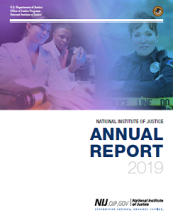Desistance from crime
Desistance as an Intergenerational Process
Diversity in Social Support Among Young Justice Involved Parents
Victimization and Desistance From Crime
Adolescent Contact, Lasting Impact? Lessons Learned From Two Longitudinal Studies Spanning 20 Years of Developmental Science Research With Justice-System-Involved Youths
Mechanisms Underlying Desistance from Crime: Individual and Social Pathways
Webinar Transcript: NIJ FY 24 Evaluation on Desistance
NIJ hosted a webinar providing an overview of the NIJ FY 24 Evaluation on Desistance Solicitation, in which NIJ seeks proposals for rigorous evaluations of desistance-focused interventions to advance understanding of strategies that might aid in the desistance process and identify innovative approaches to measure the desistance process.
Transcript...
Multidisciplinary Teams, Street Outreach, and Gang Intervention: Mixed Methods Findings from a Randomized Controlled Trial in Denver
School Transitions as a Turning Point for Gang Status
The Glueck Women: Using the Past to Assess and Extend Contemporary Understandings of Women's Desistance From Crime
Addicted to Hate: Identity Residual Among Former White Supremacists
An Evaluation of the Directional Relationship Between Head Injuries and Subsequent Changes in Impulse Control and Delinquency in a Sample of Previously Adjudicated Males
NIJ FY24 Evaluation on Desistance
A Mixed Method Evaluation of the Role of Religion in Desistance and Reentry
The Effects of Age at Prison Release on Women's Desistance Trajectories: a Mixed-Method Analysis
Some Cognitive Transformations about the Dynamics of Desistance
Desistance from Crime during the Transition to Adulthood: The Influence of Parents, Peers, and Shifts in Identity
Continuing Education: Toward a Life-Course Perspective on Social Learning
National Institute of Justice Fiscal Year 2019 Annual Report
Desistance from Crime: Interventions to Help Promote Desistance and Reduce Recidivism
No single criminal justice agency can promote desistance on its own. Partnerships across state, local, and federal agencies — along with the support of family and community stakeholders — are instrumental in supporting desistance from crime and reducing recidivism.
Law enforcement, courts, corrections, and community supervision agencies play a key role in the desistance process and reducing recidivism.
See the YouTube Terms of Service and Google Privacy Policy




